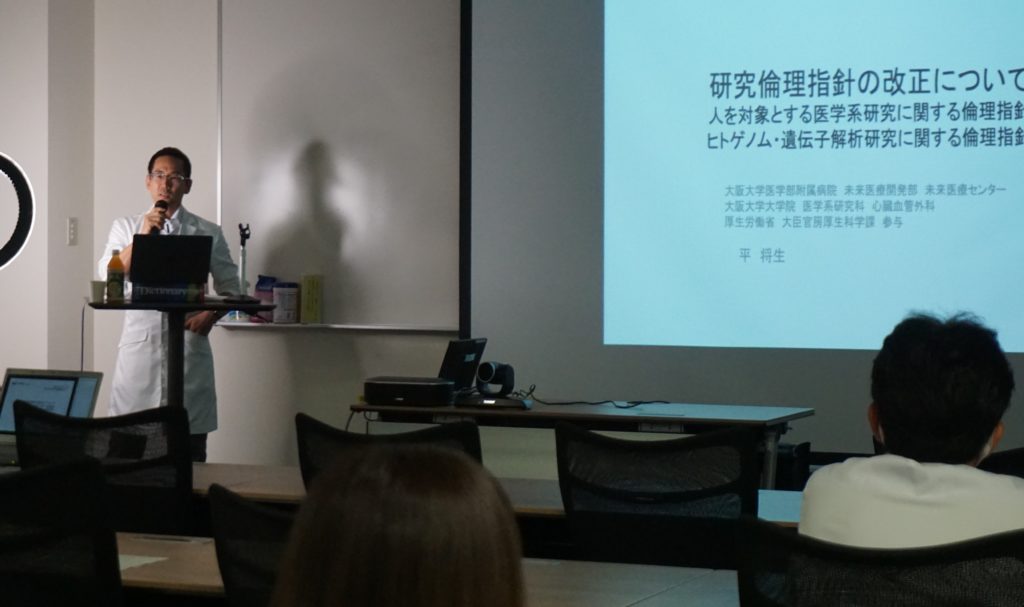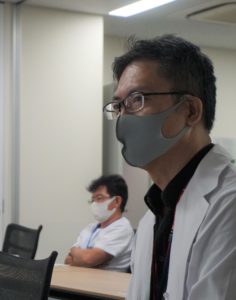(2nd Seminar Report) “Amendment of ethical guidelines for medical and health researches”
On August 21, 2020, we welcomed Associate Professor (Lecturer) Masaki Taira for the 2nd Academia Clinical Development Seminar.
The seminar under the theme was originally planned in this March, but we decided to cancel it due to COVID-19 pandemic. As we had received a lot of requests to reschedule it, taking careful precautions, we decided to hold it in the form of a hybrid event: in person and online. It turned out that more than 90 participants joined the seminar for the first time ever.

Since Dr. Taira was seconded to Ministry of Health, Labor and Welfare (MHLW), Minister’s Secretariat, Health Science Division, he has been in the project of amendment of ethical guidelines for medical and health researches which are overseen by MHLW: Ethical Guidelines for Medical and Health Research Involving Human Subjects (hereinafter called Guidelines for Medical and Health Research) and Ethical Guidelines for Human Genome/Gene Analysis Research (hereinafter called Guidelines for Genome Research.) Including key points and fundamentals of research ethics, he talked about the following four topics in the seminar: 1) a summary of guidelines, 2) procedures for informed consent, 3) handling of personal information, and 4) progress on amendment of ethical guidelines.
First, regarding a summary of guidelines, Dr. Taira touched upon important ideas from fundamentals that the both guidelines are based on. (For Guidelines for Medical and Health Research, he introduced key points from basic principles on Declaration of Helsinki, ethical principles for medical research involving human subjects. For Guidelines for Genome Research, he introduced excerpts from Universal Declaration on the Human Genome and Human Rights.) Then, he talked about how the both guidelines were developed and about those basic principles. Then, he explained about items to be included when you write research protocols.
He said it might be difficult to understand every details of guidelines, but what’s written in the guidelines are basic principles to conduct a medical research, and it is very important to conduct a research with full understanding of those key points.
Second, Dr. Taira talked about procedures for informed consent. To conduct a medical research, it is important to understand correctly whether the samples and information used in a research should be deemed to be personal information or not, and whether they should be deemed to be existing samples and information or new samples and information, then, you need to take appropriate procedures. He explained the procedures in details by using flow charts for the both guidelines.
Next, Dr. Taira explained about details of definition of personal information with examples. Applicable laws and ordinance when handling personal information differ between private sector and public sector, and furthermore, applicable laws and ordinance in public sector depend on a type of institutions. In research ethics guidelines, general rules have been set not to cause inconveniences in a joint research among multiple institutions. He talked about the importance of following ethics guidelines when conducting a medical/genome research no matter where you belong.
Last, Dr. Taira introduced the latest information about progress on amendment of ethical guidelines as he has been involved in the project as an advisor for MHLW, Minister’s Secretariat, Health Science Division. The revision of the both guidelines were discussed in the joint meeting among three ministries: Ministry of Education, Culture, Sports, Science and Technology, MHLW, and Ministry of Economy, Trade and Industry because the number of medical researches concurrently conducted with genome research has been increasing these days. Then, it was decided to consolidate the both guidelines into Ethical Guidelines for Life Science, Medical and Health Research Involving Human Subjects based on Guidelines for Medical and Health Research. Dr. Taira explained key points relating to consolidation of guidelines concretely, such as the composition of each chapter is revised to make it easy to follow.
In Japan, there are many regulations and laws to conduct a clinical research, and demarcation among regulations and laws are not clear. He pointed out the importance of Guidelines for Medical and Health Research and Guidelines for Genome Research, because the both guidelines cover basic ideas about ethics when you conduct whatever research under whichever regulations and laws.
In Q & A session after the lecture, we had a lot of questions from the audience in the meeting room and had lively discussions. According to Dr. Taira, overseas information is considered in the consolidation process, but regulations to handle personal information relating to medical information are completely different country by country. So, it is hardly reflected in the consolidation of the guidelines. However, Dr. Taira is aware that some researchers are saying that differences in handling of personal information between overseas and Japan have been an obstacle to conduct a joint research with institutions abroad, and he said it would be critical for amendment of the guidelines in the future. We’d like to keep an eye on the progress of the amendment of the guidelines in the near future.

You might think it’s difficult to understand guidelines if you’re only reading the texts. However, Dr. Taira’s lecture in plain language gave us a great opportunity to understand the key points of the guidelines.
The next Academia Clinical Development Seminar is scheduled on October 2, Friday. Its theme is intellectual property strategy of academia, and we will invite Prof. Yukio Fujisawa from Co-creation Bureau, Intellectual Property Strategy Section.
We’re looking forward to seeing you next time again.


